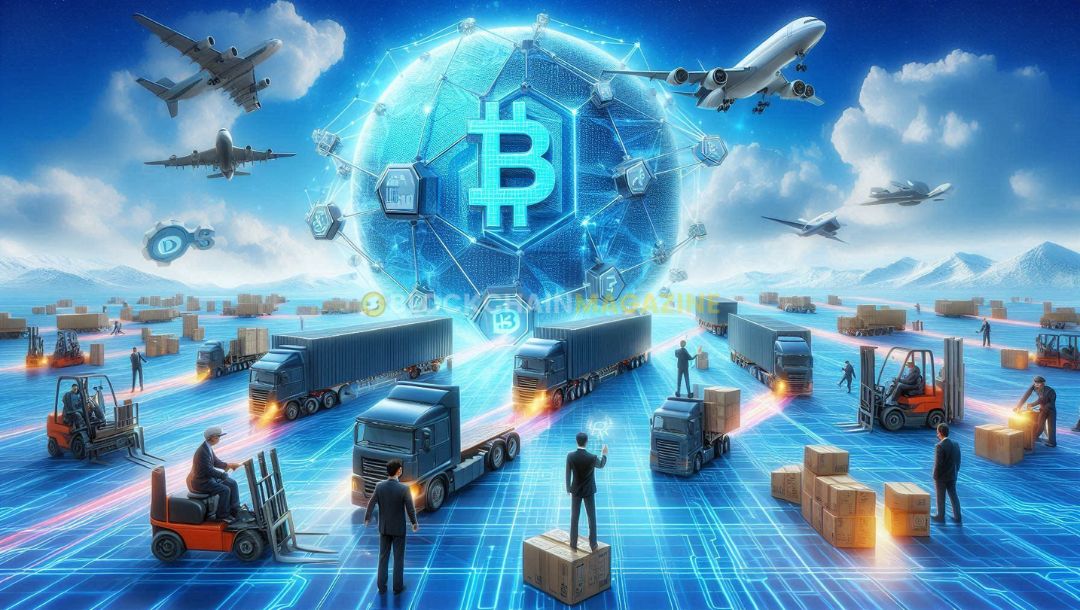Top 10 crucial impact of blockchain technology in supply chain management in 2024
Blockchain technology is changing the way we think about supply chain management. In 2024, it promises to make supply chains more transparent, efficient, and secure. This article explores the top 10 ways blockchain will impact supply chains, from improving traceability to ensuring regulatory compliance.
Key Takeaways
- Blockchain enhances traceability, making it easier to track products from start to finish.
- Improved transparency ensures all parties have access to the same information, reducing disputes.
- Increased efficiency through automation and better data sharing speeds up processes.
- Cost reduction is achieved by cutting out middlemen and reducing errors.
- Fraud prevention is strengthened as blockchain creates a tamper-proof record of transactions.
Enhanced Traceability
Blockchain technology creates a permanent record of product journeys from start to finish. This feature allows for real-time monitoring of goods, ensuring they meet regulations and quality standards. Improved traceability minimizes errors, reduces delays, and boosts overall efficiency.
In supply chain management, traceability means tracking inventory from raw materials to end customers. Blockchain enables live tracking with decentralized ledgers. Stakeholders can access detailed product information like dates, prices, origin, quality, and certification.
Blockchain solutions offer end-to-end traceability of food products. From the manufacturer to the consumer, every step in the food supply chain can be tracked, including production, transportation, and storage. This helps identify and remove affected items in case of a product recall.
Real-time tracking of goods from origin to destination makes every supply chain step visible to all participants. This transparency helps reduce delays, remove bottlenecks, and significantly lowers the risk of counterfeit goods and fraud by providing an immutable record of transactions.
Improved Transparency
Blockchain technology enhances transparency by providing a secure and tamper-proof platform for recording transactions. This ensures trust among multiple parties in the supply chain by creating an auditable record of information flows, inventory movements, and financial transactions. This transparency fosters accountability and integrity throughout the supply chain network.
For such issues, you have to build trust by demonstrating transparency benefits like increased efficiency, reduced fraud, and improved traceability. Try adopting incentive mechanisms for data sharing and use permissioned blockchains to allow controlled access to sensitive information, addressing privacy concerns while enhancing transparency.
The lack of visibility across the layered tiers of a supply chain has major implications for organizations across industries, particularly for meeting regulatory requirements, and for the identification and mitigation of supply chain risks.
Increased Efficiency
Blockchain technology significantly boosts efficiency in supply chain management. By reducing paperwork, delays, and manual interventions, it streamlines operations and cuts costs. Real-time visibility into supply chain data allows for better inventory management, planning, and demand forecasting. This leads to lower inventory holding costs and improved customer service.
- Immediate guidance enhances productivity.
- Instant assistance streamlines workflow.
- Automated tasks reduce manual processes and paperwork.
Utilizing blockchain in supply chains means fewer delays and smoother operations, making everything run more efficiently.
Cost Reduction
Blockchain technology can significantly cut costs in supply chain management. Smart contracts automate tasks like compliance checks, order fulfillment, and payment processing. This reduces the need for manual work, intermediaries, and paperwork, leading to better efficiency and lower costs.
Companies have seen impressive results by using blockchain. For example, one client retained existing customers and attracted 25 new ones within two months. They also experienced a 600% reduction in monthly expenses, a 37% profit increase, and saved 57% of costs annually.
By analyzing data stored on the blockchain, companies can find areas to improve, reduce extra inventory, optimize logistics routes, and cut waste. These changes not only save money but also help the environment by reducing the supply chain’s impact.
Embracing blockchain in supply chain management can lead to substantial cost savings and improved efficiency, making it a valuable investment for businesses.
Fraud Prevention
Blockchain technology is a game-changer in preventing fraud within supply chains. By using a decentralized framework, it reduces the chances of tampering and errors. This technology transforms digital ID systems by providing secure, tamper-proof management, enhancing security, privacy, traceability, and accountability.
Key Measures
- Data encryption: Protects sensitive information from unauthorized access.
- Employee education: Helps in identifying phishing scams and staying updated on best practices.
- Permissioned blockchains: Allow controlled access to sensitive information, addressing privacy concerns while enhancing transparency.
Benefits
- Increased trust among stakeholders.
- Reduced costs of verifying transactions.
- Enhanced security and privacy.
Prioritizing investment in strong cybersecurity measures is essential for safeguarding your brand’s reputation and ensuring uninterrupted business operations.
Real-Time Tracking
Blockchain technology makes it possible to track goods and materials in real-time as they move from their starting point to their final destination. This means every step in the supply chain is visible to all participants. Such transparency helps cut down on delays and removes bottlenecks. It also greatly reduces the risk of counterfeit goods and fraud by providing an unchangeable record of transactions.
Streamlined Operations
Blockchain technology is revolutionizing supply chain management by streamlining operations. Automated ordering systems optimize inventory management processes by efficiently processing orders and reducing manual errors. This not only enhances order accuracy but also ensures timely fulfillment of customer demands, improving overall operational efficiency.
- Offering immediate guidance boosts productivity and efficiency.
- Access to instant assistance streamlines workflow and enhances task completion.
Blockchain’s integration with IoT further enhances these benefits, providing real-time data and predictive analytics to anticipate and address potential issues before they escalate.
The adoption of blockchain in supply chain management has led to significant cost savings and increased customer satisfaction, making it one of the top 10 amazing blockchain tech you need to know about in 2024.
Better Collaboration
Blockchain technology is revolutionizing supply chain management by fostering better collaboration among stakeholders. Offering immediate guidance boosts productivity and efficiency. This technology enables seamless data sharing, ensuring that all parties have access to the same information in real-time. This transparency helps in building trust and reducing conflicts.
- Access to instant assistance streamlines workflow and enhances task completion.
Blockchain’s decentralized nature means that no single entity controls the data, making it easier for different organizations to work together without the fear of data manipulation. This is particularly useful in complex supply chains involving multiple suppliers, manufacturers, and distributors.
By integrating blockchain, companies can develop an ecosystem of technology partners, business integrators, and academic experts to access skilled individuals.
In summary, blockchain technology not only enhances collaboration but also improves overall supply chain efficiency and effectiveness.
Sustainability
Blockchain technology is a game-changer for sustainability in supply chain management. By focusing on reducing carbon footprint and waste generation, companies can contribute to a healthier planet. Blockchain allows the environmental impact of an item to be tracked and confirmed along the supply chain. This entails monitoring energy use, carbon emissions, and other key metrics.
Environmental Impact
- Sustainable supply chains play a key role in preserving natural resources and minimizing ecological harm.
- Companies can track and confirm the environmental impact of an item throughout its journey.
Economic Benefits
- Embracing sustainability can result in cost savings through optimized processes and resource management.
- Companies that prioritize sustainable practices often experience increased profitability and long-term growth opportunities.
Enhancing sustainability goals leads to positive outcomes for both the environment and financial performance.
Regulatory Compliance
Ensuring regulatory compliance is a critical aspect of supply chain management. Blockchain technology can help businesses meet various regulatory requirements by providing a transparent and immutable record of all transactions and processes. This is particularly important in industries with stringent regulations, such as food safety and mining.
Blockchain can facilitate compliance by securely storing certifications and audit records. This makes it easier to demonstrate adherence to industry-specific standards, such as Good Manufacturing Practices (GMP) and Hazard Analysis and Critical Control Points (HACCP). By ensuring that all processes are recorded and auditable, blockchain helps businesses prove their compliance with regulatory requirements.
Additionally, the evolving regulatory landscape for blockchain technology presents both challenges and opportunities. While varying standards across countries can create compliance hurdles, governments are increasingly creating frameworks to provide legal and compliance clarity. Countries like Switzerland and Singapore are leading the way by supporting blockchain innovation through friendly regulatory environments.
Blockchain technology not only helps in meeting current regulatory requirements but also prepares businesses for future compliance needs by providing a robust and transparent system.
Staying compliant with regulations is crucial for any business, especially in the fast-evolving world of blockchain and cryptocurrency. Our website offers a wealth of resources to help you navigate these complex requirements. Visit us today to learn more and ensure your business stays on the right side of the law.
Conclusion
Blockchain technology is set to change supply chain management in big ways. It makes tracking goods easier and more reliable. This means businesses can see where their products are at all times. It also helps stop cheating and mistakes. Even though starting with blockchain can be tough and costly, the benefits are huge. Companies that use it can save money and keep their products safe. As more businesses start using blockchain, supply chains will become even better and more trustworthy.
Frequently Asked Questions
What is blockchain technology?
Blockchain is a digital ledger where transactions are recorded securely and transparently. Each record is linked to the previous one, making it hard to alter.
How does blockchain improve traceability in supply chains?
Blockchain allows every transaction to be recorded and verified, making it easy to track products from the manufacturer to the end consumer.
Can blockchain help reduce costs in supply chain management?
Yes, it can. By streamlining processes and reducing the need for intermediaries, blockchain can lower operational costs.
How does blockchain prevent fraud in supply chains?
Blockchain’s secure and transparent nature makes it difficult for fraudulent activities to go unnoticed, as every transaction is recorded and verifiable.
Is blockchain technology eco-friendly?
Blockchain can promote sustainability by ensuring transparent and ethical sourcing of materials, thus supporting eco-friendly practices.
What are some challenges of using blockchain in supply chains?
Some challenges include the initial setup costs, technological complexity, and regulatory uncertainties.
Stay informed with daily updates from Blockchain Magazine on Google News. Click here to follow us and mark as favorite: [Blockchain Magazine on Google News].
Get Blockchain Insights In Inbox
Stay ahead of the curve with expert analysis and market updates.
latest from tech
Disclaimer: Any post shared by a third-party agency are sponsored and Blockchain Magazine has no views on any such posts. The views and opinions expressed in this post are those of the clients and do not necessarily reflect the official policy or position of Blockchain Magazine. The information provided in this post is for informational purposes only and should not be considered as financial, investment, or professional advice. Blockchain Magazine does not endorse or promote any specific products, services, or companies mentioned in this posts. Readers are encouraged to conduct their own research and consult with a qualified professional before making any financial decisions.

 Bitcoin
Bitcoin  Ethereum
Ethereum  Tether
Tether  XRP
XRP  Solana
Solana  Dogecoin
Dogecoin  USDC
USDC  Lido Staked Ether
Lido Staked Ether  Cardano
Cardano  TRON
TRON  Avalanche
Avalanche  Toncoin
Toncoin  Wrapped stETH
Wrapped stETH  Chainlink
Chainlink  Shiba Inu
Shiba Inu  Wrapped Bitcoin
Wrapped Bitcoin  Sui
Sui  Stellar
Stellar  Polkadot
Polkadot  Hedera
Hedera  WETH
WETH  Hyperliquid
Hyperliquid  Bitcoin Cash
Bitcoin Cash  LEO Token
LEO Token  Uniswap
Uniswap  Pepe
Pepe  Litecoin
Litecoin  Wrapped eETH
Wrapped eETH  NEAR Protocol
NEAR Protocol  Ethena USDe
Ethena USDe  USDS
USDS  Internet Computer
Internet Computer  Aptos
Aptos  Aave
Aave  Cronos
Cronos  POL (ex-MATIC)
POL (ex-MATIC)  Mantle
Mantle  Ethereum Classic
Ethereum Classic  Monero
Monero  Render
Render  WhiteBIT Coin
WhiteBIT Coin  MANTRA
MANTRA  Virtuals Protocol
Virtuals Protocol  Bittensor
Bittensor  Dai
Dai  Artificial Superintelligence Alliance
Artificial Superintelligence Alliance  Arbitrum
Arbitrum 



